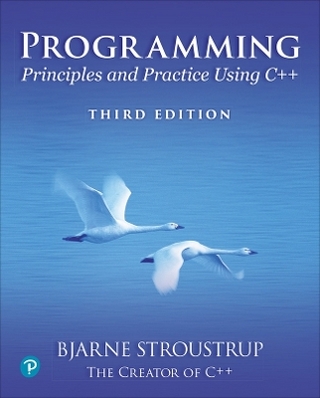
Nitty Gritty C++
Addison Wesley (Verlag)
978-0-201-75879-5 (ISBN)
- Titel ist leider vergriffen;
keine Neuauflage - Artikel merken
This book offers the ANSI C++ language in a succinct and concise form. In part one. you will not only learn the different elements of C++ coding, but will also get to know how the programming language is typically used. Part two provides greater detail on inheritance and different methods and also looks at more advanced language elements. The final section acts as a quick reference section to build your knowlegde quickly.
Till Jeske works as a freelance programmer in Munich. Besides C++ his main interests are Java development for servers and data base programming.
Preface Part I - Start up! 1 Introduction 2 The legacy of C 2.1 Variables, loops, conditional statements 2.2 Variables under the microscope 2.3 Functions 2.3.1 Example of a function 2.3.2 Return values 2.3.3 Passing parameters means copying 3 Pointers and memory management 3.1 The basic principle of the pointer 3.2 Pointers as array variables 3.3 Dynamically acquired memory 3.4 Strings 3.5 Other properties of pointers 3.5.1 Flat and deep copies 3.5.2 Non-directional pointers 3.5.3 Type security 3.6 The parameters of a program 4 Objects 4.1 A simple class 4.2 Destructors 4.3 Encapsulation 4.4 Separation of interface and implementation 4.5 Dynamically created objects 4.6 Inheritance 5 The greater whole 5.1 The properties of C++ Part II - Take that! 6 References 6.1 References instead of pointers 6.2 References as method parameters 6.2.1 Important properties 6.2.2 References as passed parameters 6.2.3 References as return values 6.2.4 const in method signatures 6.2.5 Combinations of const and references 7 Inheritance in detail 7.1 Polymorphism 7.2 Polymorphism at work 7.2.1 An example 7.2.2 Polymorphic references 7.2.3 The allure of downcast 7.2.4 Avoiding downcasts 7.3 The inheritance of interfaces 7.4 Private inheritance 7.5 Protected and friend elements 7.6 Multiple inheritance 7.6.1 Independent base classes 7.6.2 The diamond constellation 7.6.3 Virtual base classes 7.7 Objects as attributes 8 Methods in detail 8.1 Constructors and destructors 8.1.1 Constructors 8.1.2 Destructors 8.2 Methods with a special function 8.2.1 The assignment operator 8.2.2 The copy constructor 8.2.3 The relational operator 8.2.4 Default behavior 8.2.5 Preventing default implementation 8.3 Overloaded methods 8.3.1 The basic principle 8.3.2 When do parameter lists differ? 8.3.3 An example 8.3.4 Overloaded constructors 8.4 Operators 8.4.1 An addition operator for texts 8.4.2 A global addition operator 8.4.3 Other properties of operators 8.4.4 A sideways look at operators 8.4.5 Type conversion operators 8.5 Default parameters 8.6 Inline methods 9 Advanced language elements 9.1 Exceptions 9.1.1 The basic principle 9.1.2 Exceptions in methods 9.1.3 Differentiating exceptions 9.1.4 Using exceptions 9.2 Static attribute and methods 9.2.1 The basic principle 9.2.2 References to static objects 9.3 Templates 9.3.1 Abstractions 9.3.2 Classes as templates 9.3.3 Possible traps 9.3.4 Functions as templates 9.3.5 Templates or interface inheritance? 10 Hand tools 10.1 switch and enum 10.1.1 A class example 10.1.2 Multiple branches created by switch 10.1.3 Enum as a clear sets of values 10.2 Macros 10.2.1 A macro for debug outputs 10.2.2 Risks and side effects 10.2.3 Conditional translation with macros 10.3 Structs, namespaces, typedefs, unions 10.3.1 Structs 10.3.2 Namespaces 10.3.3 Typedefs 10.3.4 Unions 10.4 Type conversions 10.4.1 Implicit conversion between basic types 10.4.2 Explicit conversion between basic types 10.4.3 Conversions between classes 10.4.4 Dynamic type conversions 10.4.5 Old conversions with a new look 11 Pointers in detail 11.1 Extraneous interfaces 11.2 Undirected references 11.2.1 Adding to reference strings 11.2.2 Generating methods 11.2.3 Consuming methods 11.3 Pointers and const 11.4 Non-typed pointers 11.5 Function pointers
| Erscheint lt. Verlag | 26.10.2001 |
|---|---|
| Verlagsort | Boston |
| Sprache | englisch |
| Maße | 190 x 234 mm |
| Gewicht | 557 g |
| Themenwelt | Mathematik / Informatik ► Informatik ► Programmiersprachen / -werkzeuge |
| Informatik ► Software Entwicklung ► Objektorientierung | |
| ISBN-10 | 0-201-75879-2 / 0201758792 |
| ISBN-13 | 978-0-201-75879-5 / 9780201758795 |
| Zustand | Neuware |
| Haben Sie eine Frage zum Produkt? |
aus dem Bereich


